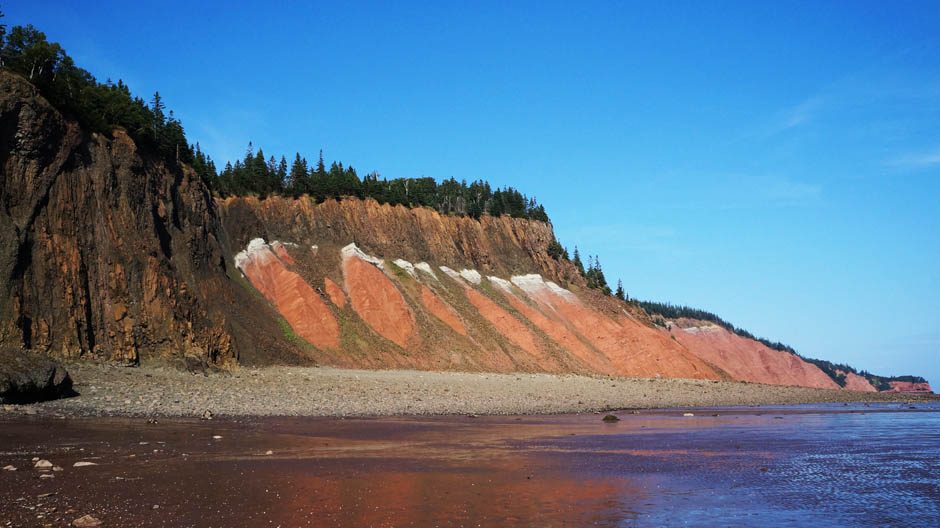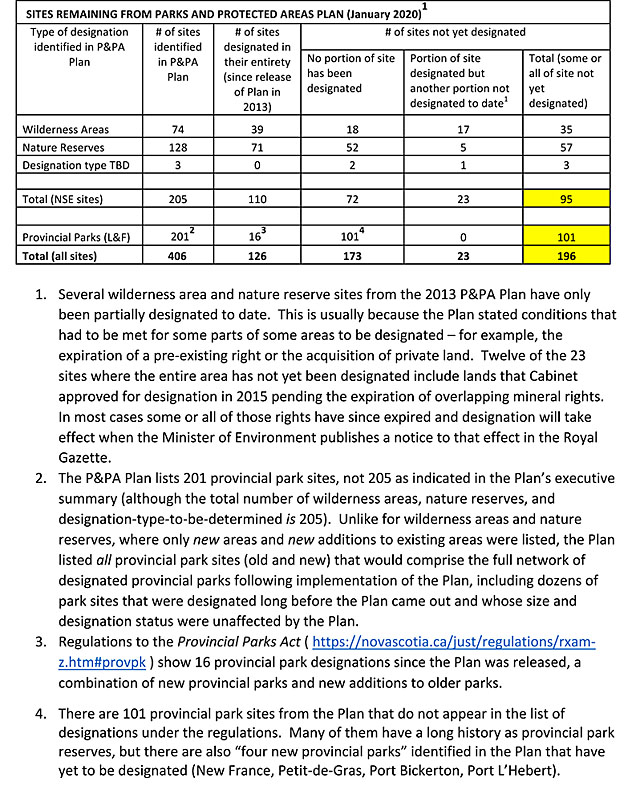What can Nova Scotia do to preserve nature and encourage biodiversity? (audio file)
CBC Info-AM Aired: Oct. 1, 2020
Abbreviated Transcript, bolding and links are inserted.
CBC (Jeff Douglas): This week the PM made a commitment ..to the UN Summit on Biodiversity. “Canada has joined the high end Coalition for Nature and People cofounded by our friends from Costa Rica and France. But there is more to do because to take care of ourselves we must take care of nature. We need to partner with indigenous peoples, root our decisions in science and seek local perspectives to build a healthier and more resilient planet.” (Trudeau)
PM Justin Trudeau says Canada is committing to protect 30% of our lands and oceans by 2030 and an interim goal of 25% by 2025. Britain and the EU have made the same commitment. The goal is to stem the catastrophic biodiversity loss. Late this summer WWF International released a stark report on biodiversity showing the 2/3rds of global wildlife has been wiped out in the last 50 years. Then WWF Canada issued its own report saying that many animal species in Canada are in decline.
Meghan Leslie is President and CEO of the World Wildlife Fund International, she is also a former NDP member of Parliament in Halifax. She is on the phone in Toronto. Raymond Plourde is also concerned with the declines in nature, he is the Wilderness Coordinator for the EAC in Halifax.
Meghan, how significant is the PMs pledge to protect biodiversity?
ML This is pretty big… it was a pledge in the election but this is the first time it has been written in black and white and also we are holding ourselves accountable to the international community.
This is important…people think sometimes, ‘loss of biodiversity’ that’s got be elephants, tigers, these charismatic species we think about in other places. But biodiversity loss is a real issue here in Canada and for At Risk Species their populations have declined by almost 60% since 1970…it isn’t just a far flung problem, it’s happening here in Canada… There are solutions, we can do this, but we need to first acknowledge that Canada has got a serious problem and we need to act.
CBC: Canada is in good company to be sure, there are 64 countries taking part in the UN Summit on Biodiversity, but.. the US and China are missing.. should we not have those counties on board?
ML: I would love to have those countries on board but just because they are not doesn’t mean we shouldn’t be taking action. The Living Planet Report Canada that we put out – there are species that are endemic to Canada, so you only find them here. There are species that are At Risk around the planet but that also occur in Canada. So we absolutely can take action.
For those species that you only find in Canada like the Vancouver Island marmot for example, we have to protect them or they will disappear from the planet….puffins are found in other countries but here in Canada we have a conservation success story… with the reduction of gill-net fishing puffin populations have been able to come back. So we are able to do it.
CBC: Raymond, the PM’s commitments sounds good… but in order for improvements to happen it is going to occur locally, this all happens where the rubber meets the road, so we need provincial and territorial buy-in. What does NS need to do now?
RP: Some nations can make these commitments and then implement a national plan, but our public lands in Canada are managed by the provinces and territories, so they have to do the actual work, designate the areas, protect them, take other measures because they control the public lands… Some have done well, NS used to be a leader but we have fallen back…we can do better.
In fact in 2013, after decades of scientific analysis and on-the-ground fact checking a whole suite of areas were put forward in the PPA Plan (Parks and Protected Areas Plan) and that Plan if fully executed would get us to 14% protection**. And yet this government has been largely dragging its feet. And like other provinces we were late in even getting to the goals that were set previously.
**I questioned RP about this number subsequently as the PPA Plan itself says 13%. Rays says that the PPA Plan included more than 13% on the assumption that some areas could be taken out, also that since then there have been private lands brought into protection, but that if all of the lands identified in the PPA plan were protected, that would bring the total to 14%. He also notes Premier McNeil was not in favour on a cap in 2013; said the Premier: “We voted in favour of the amendment in 2012, which stated at least 12% shall be protected and now that this target has reached l3%, we fully support this measure. We do not support a cap on the amount of land which could be protected as we think that is arbitrary and why would you not protect a critical habitat if it is found? Our parks and protected areas are important to Nova Scotians.” (Nova Scotia Environmental Network Election Survey, October 2013)
So back in the Rio Earth Summit in 1992, Canada committed to12% protection by the year 2000 but most provinces didn’t make, I think BC did. But NS, we were 15 years before we got to that, in 2015. We need to do better. The Premier of NS can easily, with the stroke of a pen and passing a cabinet motion, protect all of the areas in the PPA Plan and get us advanced… that’s something we need to do as part of our responsibility in the global effort.
ML: Ray hit the nail on the head there when he’s taking about Protected Areas potential for NS. When I talk about biodiversity or wildlife loss, what is the cause? Wildlife faces on average 5 threats, whether it’s pollution or transportation corridors. Basically what they need is habitat, They need a place to live, they need intact habitat that supports them…we can achieve that through Protected Areas. One of the great things for NS is that we already have this plan, the research has been done…
CBC: Why hasn’t it been done?
RP: Well I’ll be honest Jeff, the McNeil Government has not been very strong on environment, although they have done a few things which we can acknowledge like the Coastal Protection Act. By and large there seems to be a mindset in this government that is essentially ‘protecting nature is bad for the economy’… we have heard the Premier say on things like MPAs (Marine Protected Areas) and to some degree terrestrial, we have done enough. Greenhouse gas reduction, phasing out coal, we have done enough. No we haven’t, not nearly if we want make sure we have a livable province country and planet for our children and grandchildren… this is in our own self-interest…
What I would like to see the Premier do is give his governmental head a shake and realize that in this moment, the environment is as important as anything, probably more important than anything else, and give us the kind of inspirational leadership that we’ve seen just this week with his social justice announcement to better deal with the inequities in black and indigenous lives… the same integrity that he did with the Boat Harbor Act, the same integrity that he did when he guided us through the Covid crisis along with Dr. Strang. We need him to give us that level of clear-eyed, moral leadership that we need on the nature side.tBut his government is somehow still stuck in a very old 1970s kind of model where if you protect nature you harm the economy. But that is wrong… the economy is wholly owned subsidiary of the environment… without a healthy environment we will not have an economy….
CBC: We did invite the Premier and the Environment Minister Gordon Wilson to speak today… Meghan to follow up on Raymond, when people say we cannot afford to set aside land for protection because the economy and now particularly with Covid the economy has taken a hit.. what do you say to people who are unconvinced, that this IS the time to prioritize protecting nature?
ML: I have seen some incredible research out there, showing.. so we have got agriculture we need to eat, more and more we are seeing our crops being affected by drought, there is incredible research showing that is you just restore some of the native nature around that farm you can actually alter the amount of rain that is falling… this has an impact on our food system… if we are looking at marine protection,… we are protecting habitat for fish…if we wonder why the fish stocks are crashing, where can they live?… this is good for oceans it is good for land and it really is a web of life…
INTERVIEW CLOSES
Some Additional Related Links
– Timeline of Promised Protections for Owls Head
Prepared by Patricia Egli with supplementary material by Lindsay Lee on saveowlshead.org June 16, 2020
Park Reserves are not safe
– Protecting space for Wildlife: A national Habitat Crisis
on saveowlshead.org June 14, 2020. Highlights from WWF Protecting space for Wildlife: A national Habitat Crisis
This info forwarded by RP

